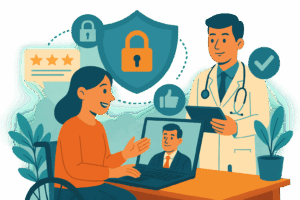
When we think about healthcare for seniors—whether that’s in assisted living, retirement communities, or just checking in from home—we usually picture doctors, nurses, and maybe that one friendly caregiver who always remembers your favorite snack. But here’s something we don’t always talk about: the behind-the-scenes digital world that keeps all those personal details safe and sound.
We’re talking about cybersecurity.
And before you roll your eyes thinking, “Cybersecurity? That sounds complicated and boring,” hang on. It’s actually a pretty big deal, especially when it comes to protecting seniors’ sensitive info. We’re not just talking about blocking spam emails. This is about making sure medical histories, prescriptions, and private conversations stay between you and your provider.
When it comes to older adults, privacy isn’t just a nice-to-have—it’s essential.
Why Cybersecurity Matters in Senior Healthcare
Think about it. Seniors’ health records contain all kinds of sensitive info—diagnoses, medications, insurance details. If that data falls into the wrong hands? That’s a nightmare.
Identity theft, medical fraud, and even wrong treatment decisions can come out of it. So assisted living facilities, doctors’ offices, and even the apps we use for telehealth visits have to lock down their digital doors. That’s where cybersecurity services for healthcare facilities really come in—they help keep everything locked up tight behind the scenes.
But here’s the thing: not every facility or platform gets it right. Some might have outdated systems, weak passwords, or sloppy data practices. That’s why understanding how to spot secure services is important. And honestly, it’s not rocket science.
What to Look for in Telehealth and Senior Portals
Telehealth is booming. It lets seniors get care without hopping in a car or navigating waiting rooms. But all that convenience means you’re trusting a platform with your medical details—especially in senior living environments, where multiple systems might be in use. So, what should you watch for?
First off: Is the platform HIPAA compliant? That acronym gets thrown around a lot, but it basically means your info is protected by strict federal privacy rules. If a telehealth service or senior portal follows HIPAA, they’re doing what it takes to keep your data secure.
Another good sign? Two-factor authentication. That’s when you need a password and a code sent to your phone. Like double-locking the door.
And check reviews. Sometimes the best way to tell if a service takes security seriously is by hearing from people who use it.
How Healthcare It Pros Help Protect Seniors
Behind the scenes, there’s a whole crew making sure senior healthcare organizations stay secure. These IT providers aren’t just tech nerds. They understand the Health Insurance Portability and Accountability Act of 1996 (HIPAA) and build defenses against cyberattacks.
That means regular system updates, staff training to spot phishing scams, and constant monitoring for anything fishy. They also help create plans to fix things fast if something goes wrong.
If you’re curious how your local provider handles all this, ask. Transparency shows they’re serious about keeping your info safe.
Keeping It Safe at Home
For seniors using telehealth from home, there are a few simple things you can do too:
- Use strong passwords.
- Don’t share your logins.
- Keep your device updated.
- Skip public Wi-Fi for anything medical.
It might sound like a lot, but once it becomes routine, it’s just part of staying safe in today’s digital world.
What if You’re Still Not Sure?
This stuff can feel overwhelming. The good news? Providers and IT teams want to make this easy. They’re working on better ways to protect your info without turning you into a tech expert.
Still stuck? Ask your doctor or care facility how they keep your information safe. If they’re proud of it, they’ll tell you.
Why It All Matters
At the end of the day, cybersecurity isn’t just tech talk. It’s trust. Trust that when your mom logs into her health portal, strangers aren’t peeking in. Trust that your dad’s telehealth session is private. Trust that the senior community where your loved one lives takes digital safety as seriously as physical health.
So next time you hear about cybersecurity in senior healthcare, don’t brush it off. It’s part of what makes modern care safer for the people who matter most.